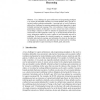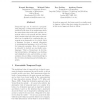109 search results - page 7 / 22 » Commonsense Reasoning in and Over Natural Language |
106
Voted
WWW
2008
ACM
16 years 2 months ago
2008
ACM
Applications of semantic technologies often require the representation of and reasoning with structured objects--that is, objects composed of parts connected in complex ways. Alth...
114
click to vote
COGSCI
2010
15 years 9 days ago
2010
It is frequently claimed that the human mind is organized in a modular fashion, a hypothesis linked historically, though not inevitably, to the claim that many aspects of the huma...
121
Voted
LADS
2007
Springer
15 years 7 months ago
2007
Springer
A key challenge for agent architectures and programming paradigms is to account for defeasible reasoning over mental attitudes and to provide associated conflict resolution mechan...
161
click to vote
KR
1991
Springer
15 years 5 months ago
1991
Springer
Temporal logic can be used as a programming language. If temporal formulae are represented in the form of an implication where the antecedent refers to the past, and the consequen...
113
click to vote
VMCAI
2010
Springer
15 years 11 months ago
2010
Springer
While temporal verification of programs is a topic with a long history, its traditional basis--semantics based on word languages--is illsuited for modular reasoning about procedura...


